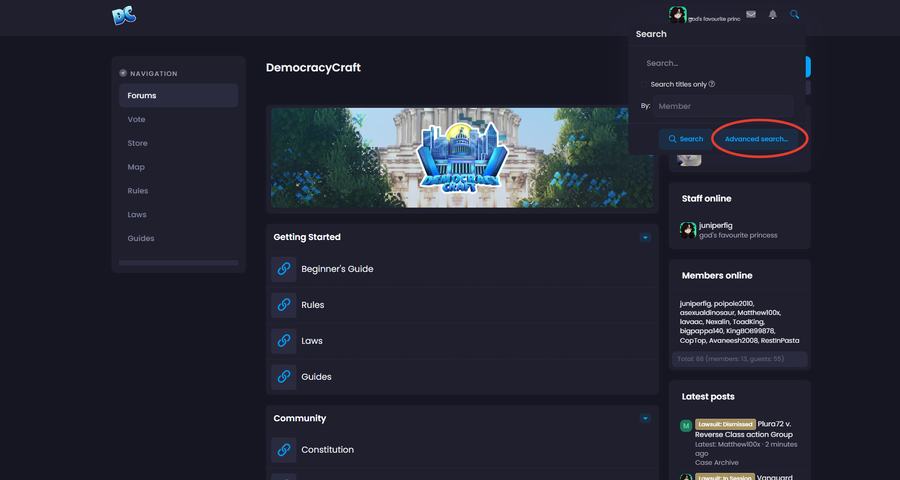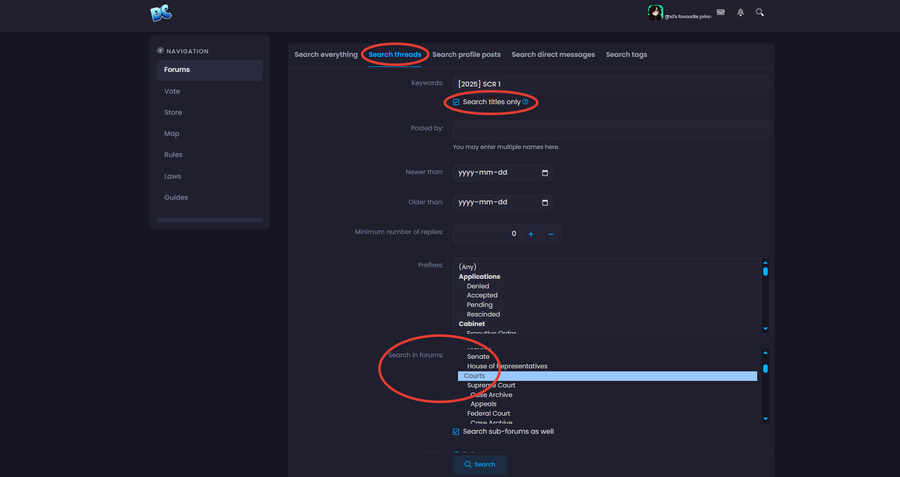Lawyer Guide
As a lawyer, your primary job is to represent players in court, consult players seeking legal advice, and marry couples.
The legal profession is organized into three ranks: Solicitor, Barrister, and Attorney.
A Solicitor is an entry-level lawyer who is permitted to practice in the District Court of Redmont, provide legal advice on matters within District Court jurisdiction, and may officiate marriage and divorce proceedings. The intended career path for Solicitors includes joining an established law firm to receive mentorship from more experienced lawyers, but you’re allowed to work on your own (within the confines of the law)!
A Barrister is a more experienced lawyer who has passed one of the six Barrister specialization exams. They may practice in either the District Court of Redmont or the Federal Court of Redmont, but may only represent clients in the Federal Court within their specializations. They may continue to practice law at a District Court level in any specialization.
An Attorney is a highly experienced lawyer who has passed all Barrister specialization exams and the Attorney exam. As an attorney, you can practice in ALL courts without any restrictions, and you’re expected to mentor lower-ranked attorneys through their legal journey.
What are these specializations?
There are currently six specializations available for Barristers.
You may specialize in:
- Administrative Law
Administrative Law primarily covers how government officials create, enforce, and challenge rules and regulations.
- Constitutional Law
Constitutional Law primarily covers the interpretation and application of Redmont’s founding principles; the Constitution.
- Contract Law
Contract Law primarily covers binding agreements between individuals, groups, and entities. It addresses the validity of agreements and the remedies available if one party fails to uphold its terms.
- Corporate Law
Corporate Law primarily covers the details of how companies are formed, governed, and dissolved. It includes matters like shareholders’ rights and business structuring.
- Criminal Law
Criminal Law primarily covers offences against society or the realm as a whole, specifying prohibited actions,the punishments for them, and rights in criminal matters.
- Property Law
Property Law primarily covers ownership of land and other assets. It regulates how property rights are acquired, transferred, or lost, as well as the responsibilities that come with ownership.
A huge part of being a good lawyer is finding precedent and laws on the DC forums. You may have stumbled into the Legal Research Guide already, which is a great overview of how to find what you need.
The DC forums search feature can be frustrating. Many DC lawyers suggest instead to go to Google and use the following tag:
site:democracycraft.net
This lets you avoid all of the finicky forum features. You should still learn how to use the forums search, though, it can be useful!
Finding Specific Cases
Head to https://www.democracycraft.net/ and click the magnifying glass in the top right. Click on “Advanced search…”.

Swap to the “Search threads” tab. Type in the title of the case you’re looking for, click “Search titles only”, and make sure you’re only searching in the Courts subforum.

Searching for Laws
Let’s say we want to find the Commercial Standards Act. The first place I’d go is to the “Laws” page… but that didn’t help. What gives?
Laws are all under Acts of Congress in the DC forums. You can peruse them by going to Congress -> Acts of Congress, then choosing a specific subforum. You can also use the method above to find laws, just change the subforum you’ve selected from Courts to Acts of Congress.
General Principles about Practicing Law
At the heart of it all, law is about fairness and truth. Whether you’re helping a business settle a contract dispute or defending someone accused of a crime, your work has real impact. Take it seriously, but have fun.
Remember that Redmont follows a common law system, which means court rulings matter. Judges don’t just apply statues. They interpret, clarify, and sometimes reshape how they’re used. That means your strong legal argument may become precedent. Every case you argue is a part of an evolving legal tradition.
You’re not just working in the system. You’re defining it.
How to Get a Job
The section we’ve all been waiting for! It’s not too complicated to find work as a lawyer. You have a few options to begin your legal journey.
1. Join a law firm.
This is the recommended path. Firms give you structure, guidance, and hopefully a steady stream of cases. You’ll get to learn from more experienced lawyers, which makes the whole thing a lot less overwhelming. Check out #links or #businesses on Discord to see who’s recruiting. You can also just start chatting in #legal—lots of people hire through networking alone.
2. Go solo.
Not into working for someone else? That’s totally fine. Plenty of lawyers start off on their own. You can advertise your services with /ad in-game or in #advertise on Discord. Just make sure you know what you’re allowed to do at your rank (no arguing in Federal Court unless you’re a Barrister in that specialization!).
3. Start your own firm.
Feeling ambitious? You can open up your very own law firm if you have the Entrepreneur qualification. Heads up—it’s more spreadsheets and hiring paperwork than courtroom drama, at least at first. But if you want to build something from the ground up, go for it. It’s a lot of work, but super rewarding.
Advice from Legal Professionals
“Yes, please, do populate your arguments with your legal framework. Cite laws, precedent, etc. Repeat.”
“Overusing objections hurts your case.”
“The profession deals primarily with reading and writing, so be ready to do a lot of both. Doing well in either means re reading/writing the same stuff over and over again. There’s no such thing as good writing, only good editing.”
“Don’t be overconfident. Redmont law is highly complex and goes way deeper than it seems on the surface. You have to know where you're starting from in able to get where you want to be, and therefore you can’t beat yourself up when you inevitably make mistakes. You have to be willing to listen to others and grow and learn in order to perfect your practice.”
“Just take your time to read each case. Don’t go in without having all the evidence.”
“Don't take on too much at once.”
